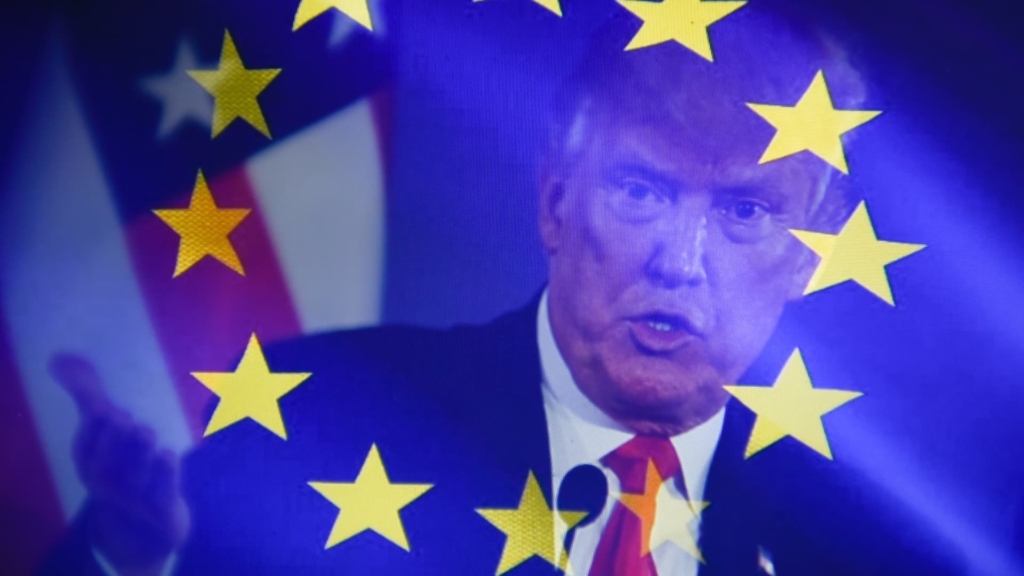Leaders of the European Union are calling for a measured reaction to the tariffs imposed by U.S. President Donald Trump that have shaken global markets. This plea comes just days after China announced its retaliatory measures against the U.S.
“The response to the tariff conflict was expected. The tremors felt in stock markets from Japan to Europe and the U.S. must be weathered calmly,” stated Polish Prime Minister Donald Tusk in a social media update translated by Google. Tusk noted that although the Polish stock market experienced a backlash, the country’s political and economic stability are key assets during these tumultuous times. “We will remain steadfast!” he emphasized.
Similarly, Germany’s acting Economy Minister Robert Habeck urged for a “calm and united” response from Europe, highlighting that individual nations cannot tackle this issue independently. His statements reflected a notably restrained stance compared to his previous remarks, in which he expressed confidence that Trump would “bend under pressure” if Europe acted cohesively regarding the tariffs.
This call for unity comes as European stock indices fell by an additional 4.2% by late morning in London, amid fears of a potential decline in U.S. demand for European products and growing recession risks in the world’s leading economy.
Both Poland and Germany are subject to 20% retaliatory tariffs as part of Trump’s recent measures targeting the EU, which were disclosed last week alongside a wider array of global tariffs.
The consequences are varied for the two nations: Germany, heavily reliant on exports, trades goods worth approximately 157.9 billion euros (about $173 billion) with the U.S. and is expected to suffer significantly in its struggling automotive sector.
In contrast, Tusk noted that the Polish economy could face a direct hit to its gross domestic product (GDP) of approximately 0.4% due to the new U.S. tariffs. The Polish Economic Institute has predicted that U.S. demand contributes a mere 2.6% to Poland’s GDP, but warns that the tariffs could pose broader indirect risks by increasing economic uncertainty across various sectors.
ING analysts have evaluated the potential impact on Central and Eastern European nations, suggesting that while the U.S.-EU trade war might not collapse the entire CEE economy through export channels, there remains a significant threat from imported inflation. They noted that perceived inflation can erode consumer confidence, leading to increased savings and stifled growth in consumption, particularly as the region recovers from recent cost-of-living challenges.
Furthermore, the analysts warned that this economic void may attract Chinese investments, which could stimulate the economy but also complicate relations for the European Commission, placing recipient countries in a precarious position amidst EU-China trade tensions.
The EU’s strategy in response to the tariffs remains uncertain, following stark warnings from Goldman Sachs that the measures could inflict a trade-related downturn of 0.7% on the eurozone’s GDP this year. Deutsche Bank analysts have similarly cautioned that Trump’s actions could reduce the EU’s economic output by between 0.4 and 0.7 percentage points, with possible repercussions for labor markets and indirect costs stemming from heightened recession risks in the U.S.
Currently, EU Commission President Ursula von der Leyen has expressed the bloc’s preparedness for “additional countermeasures” if discussions fail—indicating that the EU may soon initiate a counter-offensive. This cautious approach stands in stark contrast to that of Canada and China, both of which have already enacted retaliatory tariffs against Trump’s protectionist trade policies.
In the midst of escalating trade tensions and severe declines in U.S. and global markets, Trump reaffirmed on Sunday that he does not wish to see any downturn; however, he acknowledged that sometimes “you have to take medicine to fix something,” defending his tariff strategy aimed at reducing the U.S. trade deficit with other nations.


























